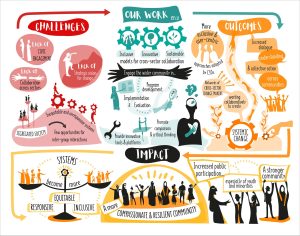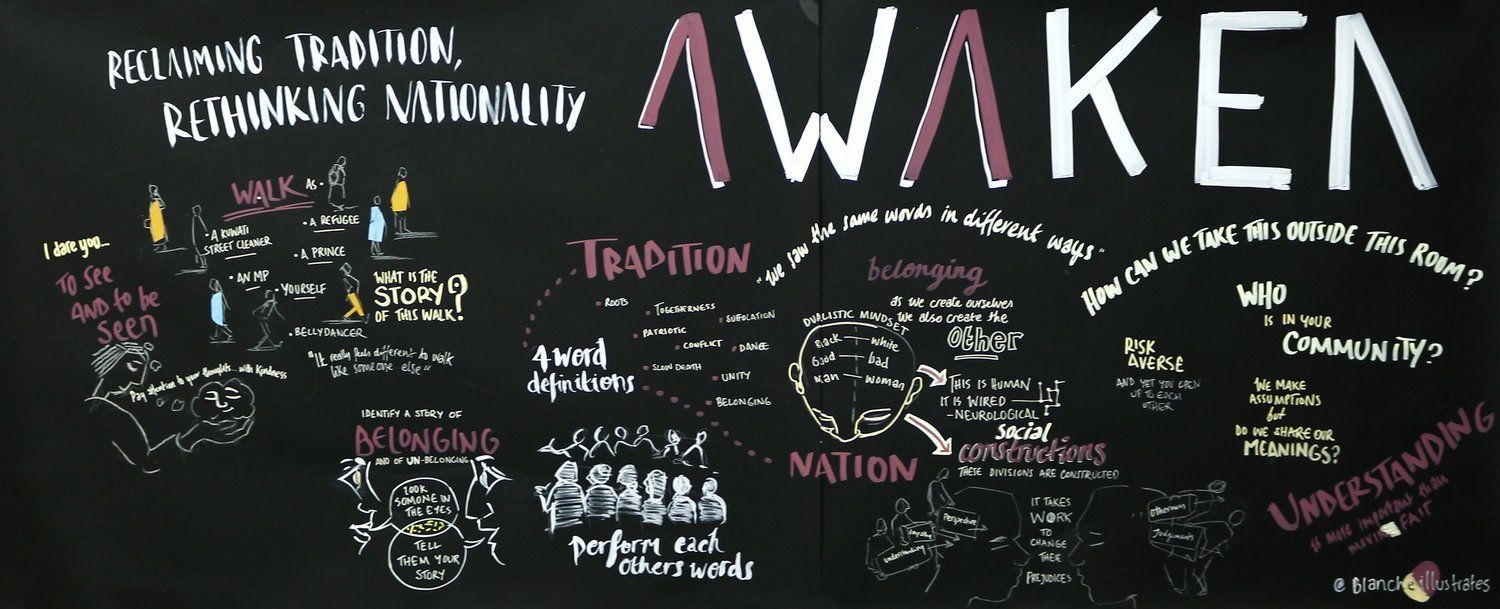Strengthening Community Resilience in Kuwait with Storytelling Strengthening Community Resilience in Kuwait with Storytelling
Insights from en.v’s Eleanor Burton and Mohammed Marafi
With a vision of a united, compassionate and resilient society, a small organisation is making a big impact on collective wellbeing across the Gulf states.
en.v facilitates positive social transformation within Kuwaiti society with an integral focus on empowering Kuwait’s migrant population – as well as youth and other traditionally silenced communities – through storytelling. Recognised by the International Labour Organization (ILO) for its impactful work supporting the human rights of migrant workers, en.v practices community-building through socially responsible ways. We talked with Eleanor Burton, en.v’s training and relationship manager, and Mohammed Marafi, en.v’s programs manager, about their use of storytelling as a tool for social transformation. Here’s how they do it.
Storytelling to Build Trust, New Narratives, and Healing Bridges
As an organisation committed to the collective wellbeing of communities in Kuwait, an integral focus for en.v is on the country’s migrant population, whose wellbeing is significantly impacted by the grave consequences they often face working under the Gulf labour market’s kafala system. Broken trust, mistreatment, and abuse are common, as are trauma and mental health struggles. Beyond legal frameworks, cultural attitudes in Kuwait have helped normalise the effects of the kafala system: with certain long-held beliefs about migrant workers and commonplace employment practices, de-facto segregation and a deeply ingrained power balance are the norm.
While important efforts are in motion to update migrant worker schemes in the Gulf and protect migrants’ wellbeing, en.v recognises migrants themselves are missing from these conversations. In response en.v passes the mic to the migrant community in Kuwait to support systemic change from the ground up. Working with employers of migrant workers and the migrant community, it offers spaces for both groups to meet and begin to build healing bridges. The process is complex, but it is working, and its Global Migrant Workers Network (GMWN), Compassionate Communities programme, and BUILD Ideathon community projects have been recognised as important actors in this process.
“The insight and connection with and from the vast network and community that en.v has nurtured over the years is unrivaled. Their ability to get straight to the beneficiary and those most in need has been inspiring to witness, and a great honour to support.” – International Labour Organization

en.v’s Theory of Change (Credit: en.v/@blancheillustrates)
en.v’s community-led approach to social change is founded on bringing different groups together to work across differences. Building bridges that lead to social change is a complex process – and for en.v, it all starts with a story.
“In every single piece of our work, whether it’s with labour inspectors, activists in the migrant community, domestic workers, students, academics, or officials from the ministry, we always start with storytelling and connection,” says Eleanor. “We start with some sort of space where we try and get people into an intimate, authentic conversation with each other. It’s in every single thing that we do – having that first moment of building trust and connection, but in safety.”
As different people come together – many for the first time – to express themselves and listen to each other, these moments of connection are rich with opportunity. They help pave the path to reconciliation by the way of self-exploration, bonding, and movement-building. With long-held beliefs contributing to divisions within the community, this is an important step towards sustainable behavioural change.
“It changed my viewpoints on others around me. I lived in a bubble and thought that there wasn’t a community of people who genuinely wanted change too.” – en.v BUILD Ideathon Participant
The AWAKEN journey.
In supporting the migrant community, this storytelling can involve facilitating conversations between workers and employers and creating space for both groups to reflect on their experiences with their peers. For example, generations-long employment practices in the Gulf shape how employers view domestic workers and how domestic workers view themselves. Through dialogue, en.v encourages everyone to practice self-inquiry and reflection. Sharing one’s story and listening to others serves as a foundational, and often emotional, step towards reconciliation.
“With storytelling, we can think about roots and forces shaping our value systems,” says Eleanor. “We can ask questions: what’s your power in the society? What privilege do you have? How do you move through the society? It’s ultimately a practice in building empathy, deconstructing a lot of the cultural norms, and thinking about how we relate to one another.”
One example of a project defined by storytelling is en.v’s Women’s Circle Project. Held in partnership with the International Labour Organization’s FAIRWAY Project, it brings together female employers of domestic workers in safe spaces to talk about employment practices. These Women’s Circles help to shift employer mindsets, leading to improved relationships and increased fair treatment of workers.
Storytelling with the migrant community also focuses on understanding values and shifting mindsets, while also caring for the deep traumas felt by the community. Their experiences in Kuwait are often defined by deep feelings of loss: a loss of self while facing exploitation at work and having to support family back home, and a loss of community due to the transient, impermanent type of residency available under the kafala system.
In response, en.v uses storytelling to help the members of the migrant community create a new sense of self and belonging, which can help strengthen their resiliency, increase feelings of agency, and promote healing – an empowering process that helps unlock doors to a new future.
Mohammed explains this process is essential for empowering community-led action: “If you want for people to really feel like they want to change this place, they first have to feel like they belong here. A lot of what we try to do in our work is try to create a space within Kuwait where they can at least feel like they belong to each other.”en.v helps create these spaces physically – with community gatherings such as its AWAKEN festival or its Aswatna program promoting inclusion in the country’s schools– and figuratively, through various activities such as Mapping Belonging and art therapies. Through different methodologies practiced in safe spaces, migrant and other traditionally silenced or marginalized communities are offered the opportunity to own, share, and rewrite their stories.

While the process of behavioural and systemic change is complex and challenging, these meaningful moments of storytelling are also important marks of progress. At the heart of this storytelling is a true sense of compassion and unity, says Eleanor: “It’s very intimate. It’s really loving work we do, that creates a space where people can really connect.”
With a vision of solidarity among communities in Kuwait, these emotional connections are the first step towards community wellbeing and healing.
en.v is a proud member of The Wellbeing Project’s Wellbeing in Higher Education Network. Learn more about en.v’s work to foster transformational leadership and community-building in the Gulf at www.envearth.com.
Voices of Wellbeing | Yazmany Arboleda, Artist Voices of Wellbeing | Yazmany Arboleda, Artist
“MY ART PRACTICE EVOLVED FROM SEEKING OUT ACCEPTANCE AND CELEBRATION OF DIFFERENCE”
Where do we have the chance to practice imagining? And how do we do that together?
Colombian American Artist, Yazmany Arboleda, recounts his process behind developing his Hospital of the Soul installation for the Wellbeing Summit for Change. In the fall of 2019, Yazmany spent time in Bilbao, Biscay, meeting citizens from the region at a constellations retreat with specialist therapist, Judith Hemming. In this interview, he shares how the heartache and pain felt by these individual Basque civilians and their families was rooted in history and impacted by the civil war beginning in the 1930s. Getting to know these people and their stories led him to reflect on his own intergenerational trauma and the experiences of his family back in the mountains of Medellin, Colombia, as well as the ongoing racial injustice and violence in America where he now lives.
Watch his full story to hear his vision for joining the threads of belonging, interconnectedness, and true celebration of difference by using art and human connection to break down religious barriers or other social constructs that may divide us.
``Time melts walls and barriers down`` ``Time melts walls and barriers down``
Voices of Wellbeing | Laura Calderón de la Barca Voices of Wellbeing | Laura Calderón de la Barca
“We need to come together, to heal together”
Words by: Laura Calderón de la Barca, speaker at The Wellbeing Summit for Social Change
The topic of individual, ancestral and collective trauma is huge and very complex. We can best understand it through individual stories that help us visualize the impact of trauma, and the ways it can heal. Also, seeing what has happened to us, has happened to others also, can help normalize the experience, and alleviate the shame that the presence of trauma often brings. In that spirit, I share here part of mine.
One thing I would like to add to what I said in the interview, is that in this windy and complex journey of coming together to heal from collective trauma, we sometimes need to create particular healing containers for different groups of people to do their particular work before we can come together with enough resources, capacities and in a safe enough way for the joint healing to happen. That means that we need to support people who share lived experience of a certain kind of trauma to come together with the appropriate facilitation to heal together, and then share healing space with others who belong to groups who have hurt them, and vice versa: those who have in their ancestry or in their current experience oppression, need to come together with others to do some healing on their own before attempting to come together with others who are or were hurt by that oppression. I have found that the best facilitation is offered by people who have healed enough from that same kind of trauma, and can bring their wisdom and presence to their facilitation.
I want to thank: my colleagues at The Collective Change Lab, with whom I have explored the intersection of trauma and social change systems; Thomas Hübl, with whom I have healed, trained and currently work with in collective healing courses and workshops; and the Zapotec communities of the Pueblos Mancomunados de la Sierra Norte de Oaxaca, Mexico, with whom I learned about the profound value of their way of life through direct experience, and discovered in the resonances that my heart and body felt, how much of that is still alive in me.
You can find more information on the systemic and collective dimensions of trauma and collective healing at the following sites:
If it’s of interest, you can also read my thesis by clicking here.
Voices of Wellbeing | Justin Michael WilliamsVoices of Wellbeing | Justin Michael Williams
“When we have internal practices, it makes it more likely for us to find meaning in our pain”
Justin Michael Williams is an author, transformational speaker, and top-20 recording artist who has become a pioneering voice for diversity and inclusion in wellbeing.
He joins us at The Wellbeing Summit for Social Change to share the importance of transforming ourselves from within so that the changes we want to see in the world can have a lasting impact.
Watch his full story to learn about the power of tying movements for change to deeper truths that go beyond our temporary emotions.
Learn more about Justin Michael Williams & his work by clicking here.













































